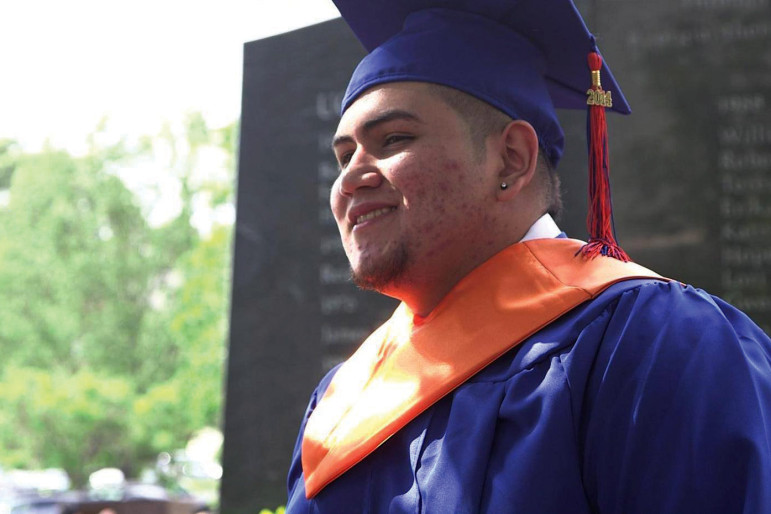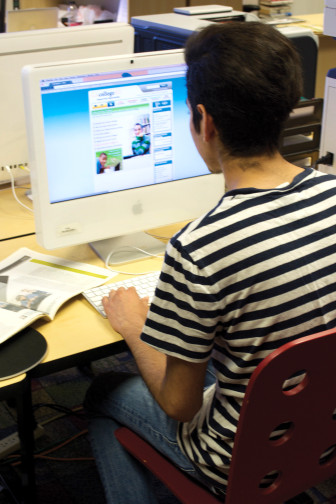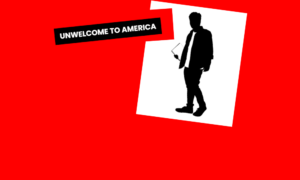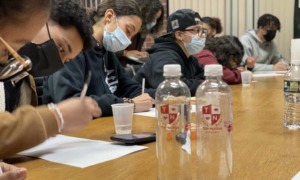
Photo courtesy of Presente Films
Alejandro Galeana-Salinas, who has lived in the United States since he was 2, found support for the college application process with two nonprofits that help undocumented students.
ATLANTA — At 9:38 on a Tuesday night, Mason (name changed) — an 18-year-old I’ve worked with for two years — texts me.
“Katie, can I call for, like, 5 min? I need someone to talk to,” he writes. We talk for about 25 minutes on the phone, during which he talks, cries and laughs while I listen. Mason’s anxious about common teen issues: his mom demands he professionalize his quirky hairstyle; they can’t get on the same page about his sexuality and her religion; and his high school teacher isn’t doing anything about the self-segregation of the black, brown and white students in his classroom.
But there’s an underlying and persistent tribulation most of his peers don’t face: his citizenship status and the legal, financial and psychological barriers that result from where he was born. He wants to apply to college as an unauthorized immigrant, but the costs are just too high, and the road ahead is too complex.
As the program director at VOX Teen Communications, I work with Mason and a diverse cohort of his peers on a weekly basis in our after-school program for teens in metro Atlanta. My social work and journalism background allows me to coach them through challenges using tangible reporting skills. The teens then create and publish content for a wider audience about a myriad of teen-specific issues.
Mason’s mom brought him to the U.S. when he was 4 months old. She’s provided little practical help to Mason as he’s navigated the college-application process because of her limited English-speaking skills.
“You can’t just wake up one morning thinking, ‘I know what to do. I know what each and every word on this piece of paper means,’” Mason told me. “I don’t have anyone to catch me when teeny tiny logistics mess up.”
First steps
At first, Mason was energetic and resilient in the college application process. But he knew his undocumented status would deny him admission to major public colleges and universities in his home state. In 2010, the Georgia Board of Regents created policy 4.1.6, which states: “A person who is not lawfully present in the United States shall not be eligible for admission to any University System institution which, for the two most recent academic years, did not admit all academically qualified applicants (except for cases in which applicants were rejected for non-academic reasons).”

Katie Vesser Strangis
A recent graduate turns to the resources — a caring adult and safe place to work — at his after-school program to look up information about how to apply to college.
Mason also knew he wouldn’t qualify for any federal or state financial aid, including the HOPE scholarship that his high school GPA made him eligible for. He learned he’d have to lean on his small network of adult supporters in the after-school space more than his parents, since neither of his parents went through the process themselves and have limited English communication abilities.
He wasn’t prepared for the exhaustion he’d feel after the Sisyphean legal, logistical and financial boulders he was pushing up the postsecondary mountain.
“You’re not going to get money from the government,” he told me, as we sat down to reflect on his journey a week before he graduated from high school. “You can only get private scholarships and private loans. You don’t get federal loans, so the interest rates are higher. It’s a mixture of financial and legal barriers you have to overcome.”
It was tricky to validate Mason’s frustrations with the process, while staying solution-focused by helping guide him to ask questions of college admissions counselors. Mason and I have both become more educated by how buried and, thus underutilized, the resources are for undocumented students. Inconsistently along the way, college admission counselors have and haven’t been knowledgeable about citizenship status differences and the policies under which undocumented minors are governed in the U.S.
In 2013, Mason received temporary status under the Deferred Action for Childhood Arrivals Initiative, or DACA. But the status, while helpful in giving him temporary relief from fear of deportation, does not help him in his pursuit of higher education. As an undocumented student, Mason is barred from applying to the major public colleges and universities in Georgia. If he chooses to attend a public university in a state that admits undocumented students, he has to pay a hefty out-of-state tuition, as do many of his undocumented peers who live in-state. Currently, only 16 states offer undocumented students in-state tuition.
Overcoming barriers
Ninety minutes east of Atlanta is Athens, Ga., home to the largest public university in the state and to 19-year-old Alejandro Galeana-Salinas, who has lived there since age 2, after his parents emigrated from Mexico to find a better life. Though he and Mason don’t know each other, their stories and statistics are similar. They are two of the 1.76 million undocumented young people who grew up in the U.S., according to a 2012 analysis of U.S. census data from the Migration Policy Institute.
In August, Galeana-Salinas will start his postsecondary career at Berea College in Kentucky. But it hasn’t been easy to overcome the legal and financial hurdles that students who are citizens may take for granted.
“I just didn’t even know the next step,” he explained, about getting his first acceptance from Oglethorpe University during his senior year of high school. Oglethorpe’s tuition and fees for the 2014-15 school year exceeded $32,000, which were comparable to the average national private college tuition last year of $31,231, according to College Board.
“I was really excited when I got the Oglethorpe letter in the mail. Then it just hit me.” The reality of having to pay for a private-school education because of the Georgia Board of Regents’ 2010 ban hit home quickly for him and his working-class family, who didn’t have the money to send him to the private institution.
Galeana-Salinas took a gap year. He pushed himself to better prepare for the college application process with two local nonprofit institutions, Freedom University of Georgia (see sidebar on page 21) and Athens U-Lead, both which help undocumented students prepare for college.
In August, Galeana-Salinas will receive scholarships from Athens U-Lead and from Berea.
Practical advice for adults
More than anything else in their attempts at higher education, both Mason and Galeana-Salinas emphasized the significance of having a network of supportive adults both in and out of school ready to work with them.
Quick Tuition Facts & Figures
Sixteen states
- California, Colorado, Connecticut, Florida, Illinois, Kansas, Maryland, Minnesota, Nebraska, New Jersey, New Mexico, New York, Oregon, Texas, Utah and Washington — extend in-state tuition rates
to undocumented students through state legislation.
Two states
- Oklahoma and Rhode Island — allow in-state tuition rates to undocumented students through Board of Regents decisions. (18 total currently allow for in-state tuition provisions to undocumented students)
Three states
- Arizona, Georgia and Indiana — specifically prohibit in-state tuition rates for undocumented students
Two states
- Alabama and South Carolina — prohibit undocumented students from enrolling at any public postsecondary institution.
Source: National Conference of State Legislatures (2/10/15)
…encourages adults to challenge federal, state and institutional policies.
Matthew Hicks is a co-director of Athens U-Lead and a literature and language teacher at Cedar Shoals High School who has mentored Galeana-Salinas.
“Un(der)documented students are all different,” Hicks said. “There’s no one situation or resource to understand. There’s only getting in there with kids in a long-term relationship where they will trust you enough to wade through their specific needs and obstacles together. They don’t even know the questions to ask you yet, so you’ve got to be there every day for when those questions come up. It’s hard, confusing, depressing and worthwhile work, but it’s even harder for them.”
Galeana-Salinas further encourages adults to challenge federal, state and institutional policies.
“Administrators need to stay on top of their state board of regents to know the policies,” he said. “If [colleges] really want diverse communities and global citizens, they need to put in the extra effort to really embody all the students, even the undocumented ones. We’ve been working for it, too. We have a different set of barriers, like other minority groups, so if you really want a diverse environment and perspectives, you have to look out for those students.”
Another practical way adults working with youth can provide support is to create safe spaces for the undocumented students they serve. Building safe space involves giving teens the important emotional space to have uncensored conversations with each other about their challenges and the creative solutions they’ve used to confront and overcome them. Adults should be proactive about communicating and checking in frequently with students and asking how to help, not if they can help. Mason and I talk a few times each week in person and check in informally by text about how he’s doing — both in the postsecondary process and about the other areas of his life.
Being available to Mason during the last two years has been more important than anything else. Now, we’re working through the timeline for his application to Georgia Perimeter College, a two-year community college he’s eligible to attend.
With persistence, undocumented students can successfully pursue a higher education, but adults should be prepared to support them through a complex — and more arduous and less predictable — process than U.S. citizens. Whether it’s extra social-emotional support, help to synthesize the onslaught of ever-changing policies, or being available to answer questions, our most important role to undocumented teens is to serve as the reliable safety net they need.
Editor’s note: Youth Today’s managing editor founded the nonprofit, VOX, 22 years ago.
“The most documented students I know.”
Freedom University of Georgia
In 2011, four University of Georgia professors and undocumented students founded Freedom University Georgia, after policy 4.1.6 prohibited admissions for undocumented students to major state universities. Freedom U is a tuition-free nonprofit organization for undocumented students built around principles of activism and college readiness. The school’s slogan is “education for liberation, not accreditation,” said executive director Dr. Laura Emiko Soltis.
Soltis said Freedom U is designed after the southern Freedom School tradition, rooted in liberatory education and “finding dignity in who you are,” helps students build the intrinsic motivation to arm themselves with resources and skills to succeed in college and beyond.
Courses last school year included “Immigration and Incarceration” and “Public Debate,” which host approximately 30 students each semester, ages 15 through 27.
Students don’t have attendance requirements, since they don’t always have time to juggle the assignments with other life demands. To balance that flexibility, Soltis teaches practical advice — like how to read in college — within the Freedom framework, so students feel welcome but also build skills they’ll need when they’re admitted to rigorous post-secondary programs.
“I try to pick material that interests them,” Soltis said.
She tells them: “These are all your weapons on your belt when you talk to the public.” By incorporating courses in Mexican history and contemporary policy and politics with an activist bent, students learn not only about their history, but how to actively change their futures.
In 2014, Freedom U students helped create and partner with Freedom at Emory, a group of student allies at Emory University, to successfully push for the private university to award need-based financial aid to undocumented students with DACA status. Emory will begin awarding undocumented students with DACA status need-based financial aid this fall, and more Freedom U courses will continue to offer its activism and college preparatory courses in the coming school year.
More information about Freedom U at freedomuniversitygeorgia.com.
– Katie Vesser Strangis
Resources
- Atlas DIY — Based out of Brooklyn, Atlas DIY is also an online cooperative with YouTube videos and free legal aid for undocumented immigrants.
- 1IvyG — A nonprofit organization founded for first-generation Ivy League students, which is inclusive of the growing high-achieving minority populations, founded by three first-generation Brown University students (disclosure: VOX alumnus Stanley Stewart co-founded this organization).
- BestColleges.com publishes a “College Guide for Undocumented Students.”
- College Board published “Young Lives on Hold,” a 2009 report by Roberto G. Gonzales which notes: “Each year about 65,000 undocumented children who have lived in the United States for five years or longer graduate from high school” (citing a UNICEF statistic). This report details the diversity of undocumented youth, barriers to college attendance and the economic and public challenges that result.
- Educators for Fair Consideration — A California-based organization whose “mission is to empower undocumented young people to achieve their academic and career goals and actively contribute to society,” E4FC offers a range of services and resources, including a list of scholarships that don’t require documentation proving citizenship or legal residency.
- Get Me to College “provides all kinds of college admissions and college success advice, including 2015 information about undocumented students at a long list of colleges (if/how they should apply, who to contact, etc.).
- MALDEF, a Latino legal civil rights organization, offers a scholarship Resource Guide for high school, college, and graduate students; a Law School Scholarship Program for law students; and a DREAM Act Student Activist Scholarship Program for college and graduate students.































